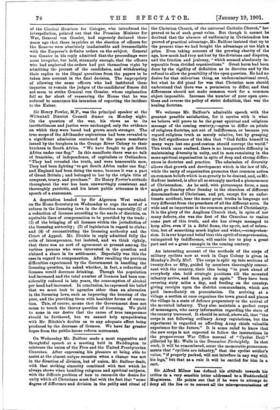We welcome Mr. Balfour's admirable speech with the greatest possible
satisfaction, for it carries with it what we believe will prove to be the great spiritual and religions message of the coming century,—agree to differ on points of religious doctrine, not out of indifference, or because you regard religious truth as merely relative, but by grasping the full significance of the idea that "God fulfils himself in many ways lest one good custom should corrupt the world." This truth once realised, there is no insuperable difficulty in maintaining diversity in unity, and in men remaining in the same spiritual organisation in spite of deep and strong differ- ences in doctrine and practice. The admission of diversity allows that growth and development which is the law of life, while the unity of organisation promotes that common action on common beliefs which is so greatly to be desired, and, as Mr. Balfour insisted, is after all so strongly marked a phenomenon of Christendom. As he said, with picturesque force, a man might go Sunday after Sunday to the churches of different denominations of Christians, and yet, except for an unfor- tunate accident, hear the same great truths in language not very different from the preachers of all the different sects. So wide and so important is the common ground of Christianity. It is the glory of the Anglican Church that, in spite of her many defects, she was the first of the Churches to realise some part of this truth, and she has always managed to keep alive, even if in a fitful flame, the spirit, not of tolera- tion, but of something much higher and wider,—comprehen- sion. It is our hope and belief that this spirit of comprehension, unimpaired by indifference, will enable her to play a great part and set a great example in the coming century.






































 Previous page
Previous page